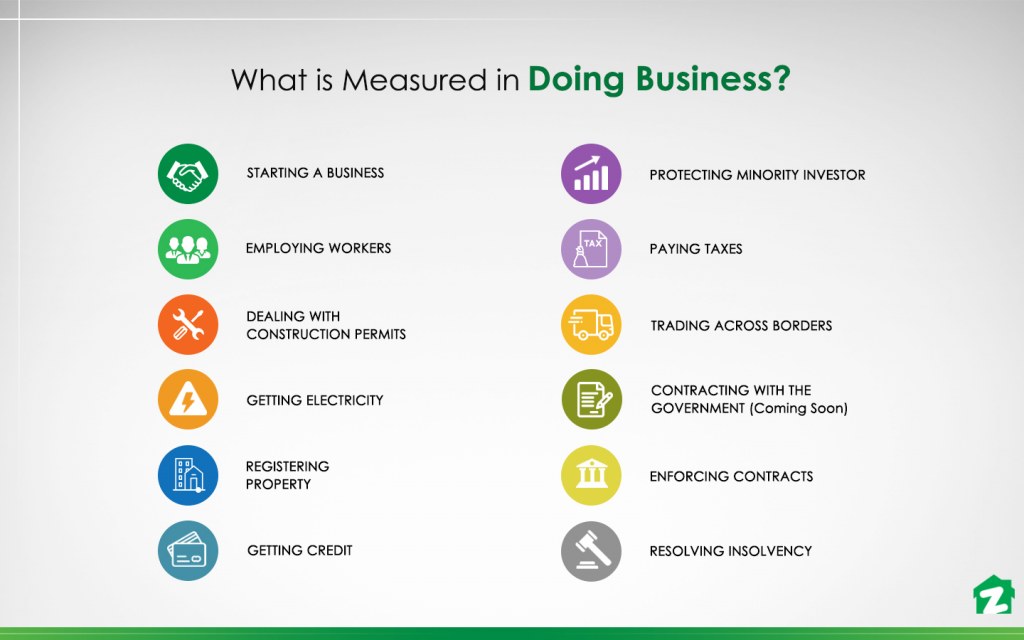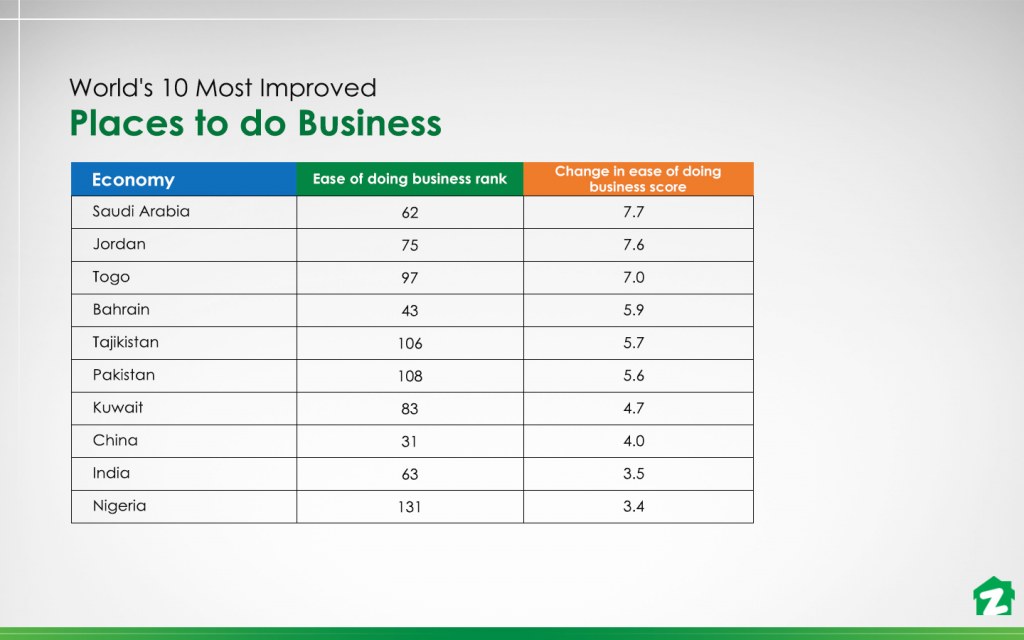Home » Laws & Taxes » Pakistan is Among the Top 10 Most Improved Places to Do Business
Update: (July 27, 2021): Pakistan has secured a position among the top ten economies in the world with the most improved business environments, according to the Annual Report on Investment Security of China’s Belt and Road Construction (2021) released by a Chinese think tank.
The report stated that Pakistan has recently introduced many reforms, aiming to simplify the entire process of setting up a company as well as acquiring a construction permit.
It further added that these “ease of doing business” measures have also resulted in an increased inflow of foreign investments in the country, which is expected to improve Pakistan’s economic position year after year.
If you want to learn more about the concept of “ease of doing business” in Pakistan and how it has improved the country’s position on the world bank’s index, continue reading this post.
Pakistan emerged as one of the top 10 business climate improvers in the world and an overall global ranking of 108 – jumping 28 spots ahead, as previously the country was standing at 136 – on World Bank’s Ease of Doing Business Index 2020. So, which business reforms helped the country achieve this status? In this blog, we will discuss the six regulatory reforms that have streamlined the processes of doing business in Pakistan.
Ease of Doing Business in Pakistan
How is “ease of doing business” measured? The World Bank’s report evaluates economic regulations in 190 countries in 12 areas of business activities. This report is the 17th edition of a study that has encouraged governments across the globe to introduce business reforms with an aim to boost economic growth in their respective countries. Check out the metrics of doing business.

The global study looks at the regulations that affect a business, from setting up through handling its operations and introducing a secure business environment. The following metrics determine how the country has fared in the global index:
- Starting a business
- Dealing with construction permits
- Getting electricity
- Registering property
- Getting credit
- Protecting minority investors
- Paying taxes
- Trading across borders
- Enforcing contracts
- Resolving insolvency
There are two lists – one shares the score of the best places to do business and the other shares those economies that have improved the most since last year.
Best Places to Do Business in the World

The World Bank’s report shows the scorecard of the top 10 economies which provide the best business environment:
- New Zealand – 86.8
- Singapore – 86.2
- Hong Kong SAR, China – 85.3
- Denmark – 85.3
- The Republic of Korea – 84
- The United States – 84
- Georgia – 83.7
- The United Kingdom – 83.5
- Norway – 82.6
- Sweden – 82
Most Improved Places to Do Business in the World
Pakistan has grabbed the 6th position among those economies that have improved the most in their “ease of doing business” score. According to the study, following are the best places to do business in the world and their scores out of 100.
Countries that have shown significant improvement in the business reforms are:
- Saudi Arabia
- Jordan
- Togo
- Bahrain
- Tajikistan
- Pakistan
- Kuwait
- China
- India
- Nigeria
Let us discuss what business reforms paved the way for Pakistan’s success.
Business Reforms in Pakistan 2020

Pakistan’s significant rise reflects the efforts of both the federal government and provincial governments of Sindh and Punjab over the past year. One of the most common features that can be seen across all economies that have improved their business environment is the widespread use of electronic systems. In 2019, three reforms were introduced but in 2020 6 regulatory reforms have been initiated.
‘Starting a Business’ Reforms
Starting a business was made easier by expanding the procedures available through the online one-stop-shop, both in Karachi and Lahore. Processes involved in opening up a business have been streamlined because of which the time, steps in the process and cost incurred in starting a business have been reduced significantly, because of which the number of registrations has increased. Before the reforms, it used to take around 9-10 days to open up a business, but now it only requires a day to open up a business without registering with the Federal Board of Revenue (FBR), through which you end up with a Sales Tax Registration Number (STRN).
With the registration of STRN, it requires 7 days as compared to 16-17 days before the business reforms 2020. There are only 2 steps involved now as compared to the 10 steps before the reforms were introduced. The cost to start a limited liability company has also been reduced from PKR 3,200 to 1,950 in Lahore and from 3,200 to 2,950 in Karachi. As per the statistics shared by the Pakistan Doing Business website, the total number of registrations have increased from 54,834 in 2017 to 100,000 in 2019.
The Securities & Exchange Commission of Pakistan (SECP) has made the process of registering a new company easier in the following ways:
- Simplifying user registration process
- Issuance of scanned copy of certificate of incorporation via email
- SECP’s E-services are also integrated with EOBI, FBR and the business registration portal of Punjab and Sindh.
- The Labour Department, Punjab has also waived off the registration fee
Dealing with Construction Permits
The reform has impacted the procedure, time and cost to complete formalities to build a warehouse dealing with construction permits. In Karachi, the total steps involved in obtaining a construction permit have been reduced from 18 to 7.
Earlier, it used to take around 8-9 months, i.e. 260 days, to get the permit, but now that the process has been streamlined, it only takes 92 days to get a construction permit. The cost involved in getting one in Karachi was PKR 695,175 and now it has been reduced to PKR 448,000.
The number of steps in obtaining a construction permit in Lahore, Punjab, have been reduced to 7, while previously there were around 20 steps involved. A drastic cut in time: From 266 days to 70 days only. There is a significant drop in price as well. The cost has been reduced from PKR 311, 150 to PKR 170,650.
Getting Electricity Reforms
The process of getting a new electricity connection has also improved in Karachi and Lahore. Before the ease of doing business reforms in Pakistan were introduced, it used to take 185 days and now in only 125 days you can be connected to the electrical grid in Karachi.
The transparency of the tariff has also improved the business climate in Pakistan. The cost to get a new electricity connection for businesses in Karachi has been reduced to PKR 2.3 million. Previously, a cost of PKR 2.7 million was incurred.
In Lahore, the number of days has been reduced to 96 from an earlier record of 117 days in getting a connection. There has been a drastic reduction in the costs involved to set up a new connection in Lahore for businesses. The cost has dipped from PKR 2,703,265 to PKR 877,350.
Registering Property Reforms
This reform measures the quality of the land administration system and the procedure, time and cost to transfer and register a property. In Karachi, the procedural steps have been cut down from 8 to 6. Previously, it used to take around 208 days to register a property, but now it only takes 17 days. Before the ease of doing business reforms in Pakistan 2020 were introduced, it took PKR 18,300 to register a property, but now it only takes PKR 300 in Karachi.
Paying Taxes
The World Bank also assesses how easy it is for businessmen to file taxes in a country. The process of tax payment is already in place and, thanks to the relentless efforts of the government of Pakistan, now it only takes minutes to do it online. The number of payments has been reduced from 47 to 10 for Punjab and from 47 to 21 for Sindh. Furthermore, the corporate tax rate reduces by 1% every year. A businessman can also file taxes online now.
Trading Across Borders
The reform involves the duration of trading across borders and also the number of documents required in the import or export, which have been minimized.
The following documents for exports have been reduced to:
- The no requirement to get Price Certificate from All Pakistan Textile Mills Association (APTMA)
- Plant Protection Department and Animal Quarantine Department have been electronically integrated with Web Based One Customs developed by Pakistan Revenue Automation Ltd. (PRAL). This measure helps save time and reduces the need for getting the documentation done.
Documentation reduced for imports as the following documents are no longer required:
- Pre-shipment Inspection Certificate
- Technical Standard Certificate
- Certificate of origin
So, these were some of the major business reforms in Pakistan that have ranked the country as one of the top 10 most improved economies in the world.
Planning to set up a business in Pakistan? If yes, then you should take benefit from the above regulatory reforms the government has put in place. If you have already opened up a business in Pakistan and have benefited from any of these reforms, then do share with us your experience in setting up a business in Pakistan.
Our email address is blog@zameen.com. Also, subscribe to Zameen Blog for regular updates and insights related to real estate and property in Pakistan. Happy Reading!



